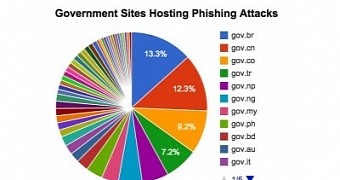Sponsored .gov top-level domain (TLD) reserved for government websites is also a prime target for cybercriminals, who breach them and host phishing pages, thus obtaining an elevated level of trust and ensuring a higher success for their scams.
Given that it should also benefit from increased protection, it seems unlikely for crooks to be able to take advantage of this, and yet, this type of event is quite common.
A study from Cyveillance shows that at the top of the list of countries whose government websites are most infested by phishing pages are Brazil and China. Together, they accounted for a fourth of all the government hosted phishing attacks.
Out of a little more than 72,000 phishing links gathered since September 2013 until September 2014, the company found that in 195 of the cases the attack was hosted on a site administered by the government of a country. In the case of Brazil, a total of 26 .gov online locations had been compromised, while in China there were 24 incidents.
Based on the data gathered, Cyveillance noticed that most such attacks occurred in countries with a fast growing economy, where security of online locations is probably not too high on the list of priorities.
The company admits that some of the countries use a different TLD, as it happens in Spain, where the government websites are recognized by the .gob suffix. However, the researchers have no reason to believe that the results of the study are inaccurate.

 14 DAY TRIAL //
14 DAY TRIAL //